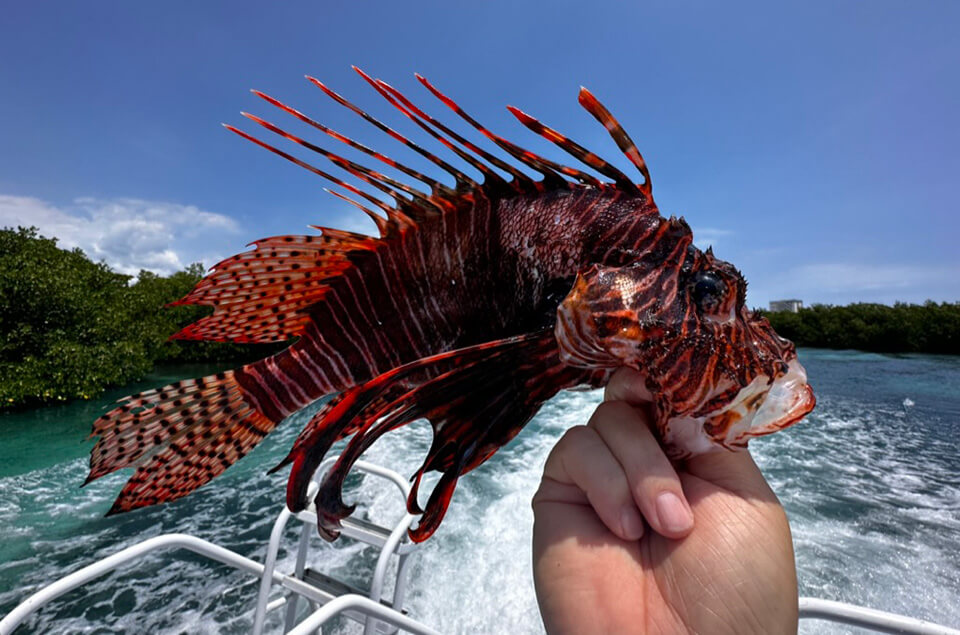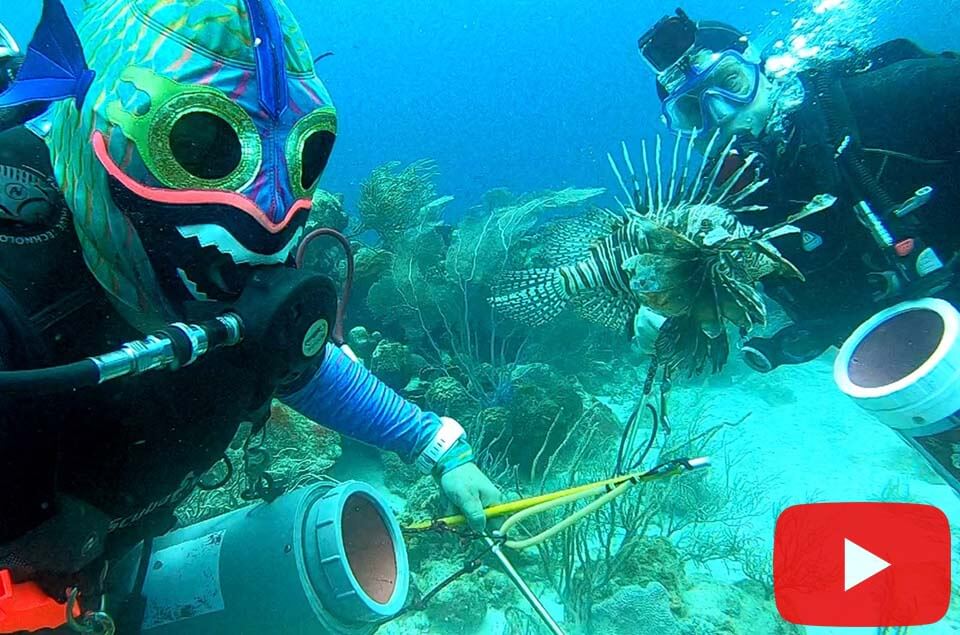Lionfish Sting: How Venomous Are Lionfish?

Everyone knows not to approach a lion in the wild, but how about a lionfish? Lionfish are carnivorous and venomous fish that can be dangerous to humans and other species. Although they don’t intentionally attack, lionfish have venomous spines that can sting humans and cause painful sores.
Lionfishdivers.com was founded by Roger J. Muller, Jr., an International Lionfish Hunter and Professional Scuba Instructor who’s dedicated to spreading the word about the lionfish invasion. Learn more about lionfish and how venomous a lionfish sting can be.
Lionfish Basics
Lionfish are a species of marine fish that feature brown, maroon, or white stripes. They also have many venomous spines, tentacles, and fins with a similar appearance to fans. These spines can sting humans upon injection and deliver lionfish venom that can cause serious side effects.
Lionfish are known as an invasive species because they have spread from their native habitat of the Indo-Pacific region to the Atlantic Ocean, negatively impacting the ecosystems there. Lionfish are also rapid reproducers and non-selective feeders. That means they can quickly increase their population while eating voraciously. That can ultimately decrease the populations of other fish and has led to damage to the underwater environment.
Lionfish Stings 101
When a lionfish feels threatened, usually when a human purposely or accidentally touches it, it can sting them with its venomous spines. A lionfish sting is a defensive mechanism – it is not done on purpose or out of aggression. However, the sting delivers a venomous dose of a neuromuscular toxin that can cause distressing symptoms. Stings can affect people differently, depending on how deep the wound is and how much venom is injected. One thing that’s for sure is that they are not pleasant.
People may wonder if a lionfish sting is poisonous, but it is not. Lionfish stings are venomous, not poisonous. That is because of the method by which venom is delivered. Lionfish inject venom into the body through spines. However, poison is administered differently, as it must be inhaled or ingested. Although a lionfish sting is not poisonous, it is still a serious injury and can be dangerous.
Side Effects of a Lionfish Sting
Since a lionfish sting delivers a neuromuscular toxin, it results in physiologic changes and side effects in the affected person. The side effects typically develop shortly after the sting, appearing anywhere from a few minutes to a few hours later. Some of the most common side effects include:
- Intense pain at the puncture site
- Tenderness
- Swelling
- Bruising
- Weakness
- Sweating
- Headache
- Nausea or vomiting
If a sting involves more spines, it’s likely to have more serious side effects that impact the whole body than a sting with less. These side effects include infection, low blood pressure, fainting, cardiac arrhythmias, and even temporary paralysis. However, deaths from lionfish stings are very rare. When they do occur, they are usually caused by side effects in conjunction with other existing medical issues.
What to Do if You Get Stung by a Lionfish
So, what should someone do if they get stung by a lionfish? No one wants to get stung, but the good thing is a lionfish sting is not generally life-threatening. You can usually manage it without medical treatment by taking some first-aid steps to control the side effects and risk of infection. These steps include:
- Carefully remove the spines from the wound, making sure to wear puncture-resistant gloves or use tweezers.
- Apply pressure with a clean towel or cloth to stop any bleeding.
- Wash the affected area with soap and water.
- Soak the affected area in hot water for 30 to 90 minutes (the water should be hot enough to tolerate but not enough to burn).
- Cover the wound with a bandage.
- Use over-the-counter medication for pain management.
- Ice the wound if needed to reduce symptoms.
The pain at the puncture sight will usually subside within a day or two, while other symptoms can last up to a month if the sting is very severe. If the lionfish sting and resulting side effects are mild enough, many people manage them at home without medical intervention. However, if someone experiences severe pain or other serious side effects, they should promptly go to an emergency room or urgent care center.
How to Protect Yourself from a Lionfish Sting
There are certain precautions people should take to help prevent the chance of a lionfish sting, especially if they have a higher likelihood of encountering one. Those who should exercise caution include:
Aquarium Handlers and Owners
Lionfish are common in both home and public aquariums and commonly injure people who try to handle them improperly. Handlers and home aquarium owners should use nets to catch them and wear puncture-resistant gloves when feeding or transferring them. They should also be aware that lionfish can still sting up to 48 hours after dying.
Tourists
Lionfish have invaded the Atlantic Ocean and are now established along the Eastern Seaboard of the U.S. and into the Caribbean Sea and Gulf of Mexico. In the Caribbean, many places depend on water-based activities like snorkeling or diving for tourism revenue. Instructors and participants in these activities should be aware of lionfish, how to identify them, and how to avoid contact with them should they come across them. They should also be familiar with lion sting treatment information.
Divers
If a person frequently dives in the Atlantic Ocean, they will likely come across a lionfish or multiple when they’re underwater. That is what makes it important for people like divers to know about lionfish and what they look like so they can avoid them. Divers should also report lionfish sightings to their local environmental agency if they track the invasive species.
Lionfish Hunters
Since lionfish are invasive in the Atlantic and Caribbean Oceans and are wreaking havoc on the ecosystems, people are beginning to engage in lionfish hunting or killing and removing the fish. Lionfish must be killed with spears and handled safely after to prevent injuries. Lionfish hunters also need the proper hunting equipment to protect them from a sting if one happens. These include:
-
- Spears
- Spear tips
- Containment devices
- First aid kits
- Puncture-resistant gloves
Having these equipment items is the best way to stay safe and prepared when hunting for lionfish.
Ultimately, researchers believe that the best way to prevent a lionfish sting is through avoiding contact. Lionfish divers should use a container when spearfishing, rather than try to handle the fish or cut off the venomous spines while diving. You can safely trim the fish once you are out of the water. It is also recommended that people take certain measures to decrease the health risks of a lionfish sting.
Frequently Asked Questions About Lionfish Stings
Are lionfish aggressive when they sting?
Lionfish are not aggressive toward humans. Although they sting humans, they won’t go out of their way to sting one. Lionfish sting as a defense against a threat, similar to a bee’s sting.
Is there a cure for lionfish venom?
There is no cure for lionfish venom, but there are ways to help lessen the intensity of it and relieve the pain. One of the best ways to alleviate pain is heat treatment, which involves placing the affected area into hot (not scalding) water for 30 to 90 minutes. That helps to break down the venom and decrease its effectiveness.
Do you need to see a doctor after a lionfish sting?
Many people can manage their lionfish sting side effects without seeing a doctor. However, certain people should seek medical attention for a lionfish sting. These include people who cannot fully remove the lionfish spines from the wound, have no tetanus immunization, or are allergic to other types of stings like bees.
Can you die from a lionfish sting?
There have been no documented reports of fatalities from a lionfish sting. However, those with underlying medical conditions may experience more severe consequences from a lionfish sting. For example, sensitive individuals may be more affected by the shock intensity, complications from the shock, and even the shock itself.
Additionally, those allergic to traditional bug bites or stings may suffer a higher risk of fatality from a lionfish sting. Those interested can learn more about how to deal with a lionfish sting on our blog. We also have options for self-care first aid treatment.
Do lionfish sting other fish?
Lionfish do not sting other fish— they only use their spines to sting humans. To capture their prey, lionfish hide in areas like seagrass or reefs to ambush the fish. They then use their large fins to corner the fish and swallow it whole.
What does it feel like to get stung by a lionfish?
The main complaint after a lionfish sting is the pain people experience, which many describe as intense, sharp, throbbing, or burning. Roger J. Muller, Jr., founder of Lionfishdivers.com, has firsthand experience of what it’s like to get stung by a lionfish and shares insight on how it feels.
Learn More About Lionfish Stings
Now that you know about lionfish and their dangerous stinging spines, you can spread awareness to others and stay away should you encounter one. Lionfishdivers.com helps to share information about lionfish, lionfish hunting, lionfish cooking, and more with people in New Jersey and beyond. For more information about these topics, contact Roger J. Muller, Jr. at Lionfishdivers.com today.






